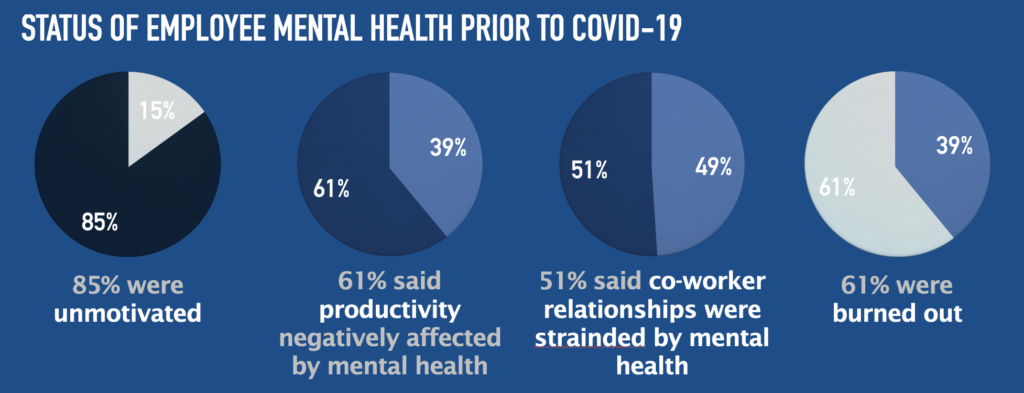Mental Health Prior to Convergence of Traumas
Earlier this week we wrote about the emotional and psychological impact of COVID-19, the recession, Me Too movement, and racial injustice as collective traumas. According to the graph below, before COVID-19, US employees were already struggling with significant mental health concerns. We were multitasking, over-committing, and racial injustice was unchecked.

The financial impact of mental health on the workplace was staggering. It cost US companies $80-100 billion and 400 million days of lost work annually. The World Health Organization and the Centers for Disease Control and Prevention called for workplace cultures that supported the mental health of employees.
Traditional Resources Are Not Enough
Traditional resources such as employee assistance and stress management programs are frequently offered in response to employee mental health concerns. These necessary programs are aspects of comprehensive workplace responses, but not sufficient. Asking employees to be resilient when we haven’t asked how they are doing may create resentment. Suggesting they find time for self-care when they are already exhausted can fall flat. Referrals to other resources may feel dismissive. Our best foot forward is to create a workplace that just makes them feel better. Let’s offer them the same sense of security an employee experiences during a pandemic when they know they are coming into a sterile environment. In a mental health informed workplace, they would have the same sense of emotional and psychological safety.
Change Starts with Leaders
Mental health informed workplaces start with leaders who are emotionally and collaboratively intelligent. The good news is that you can increase your capacity in these areas of intelligence. Leaders with strong associated skill sets identify their own feelings related to the current challenges and explore how their feelings impact how they lead. They have their own care system in place because they know that if they are paying attention to what’s important, they need supportive outlets.
These leaders ask how people are doing and mean it. They have the courage to check in one-on-one when they are more likely to get an honest response. They are insightful and know not to jump in and fix the problem or suggest a resource right away. They listen first. They respond with empathy, avoid judgment, and keep the doors of communication open. They make mental health a topic of conversation.
The best leaders are guided by their values. How they model care is how employees will care for suppliers, retailers, customers, and other stakeholders. Most importantly they model how employees can care for one another. The leaders we need now in this time of crisis are those who will help heal our organizations and our communities too.
Join us for our next blog as we explore how addressing institutionalism racism is part of the Mental Health Informed Workplace.
